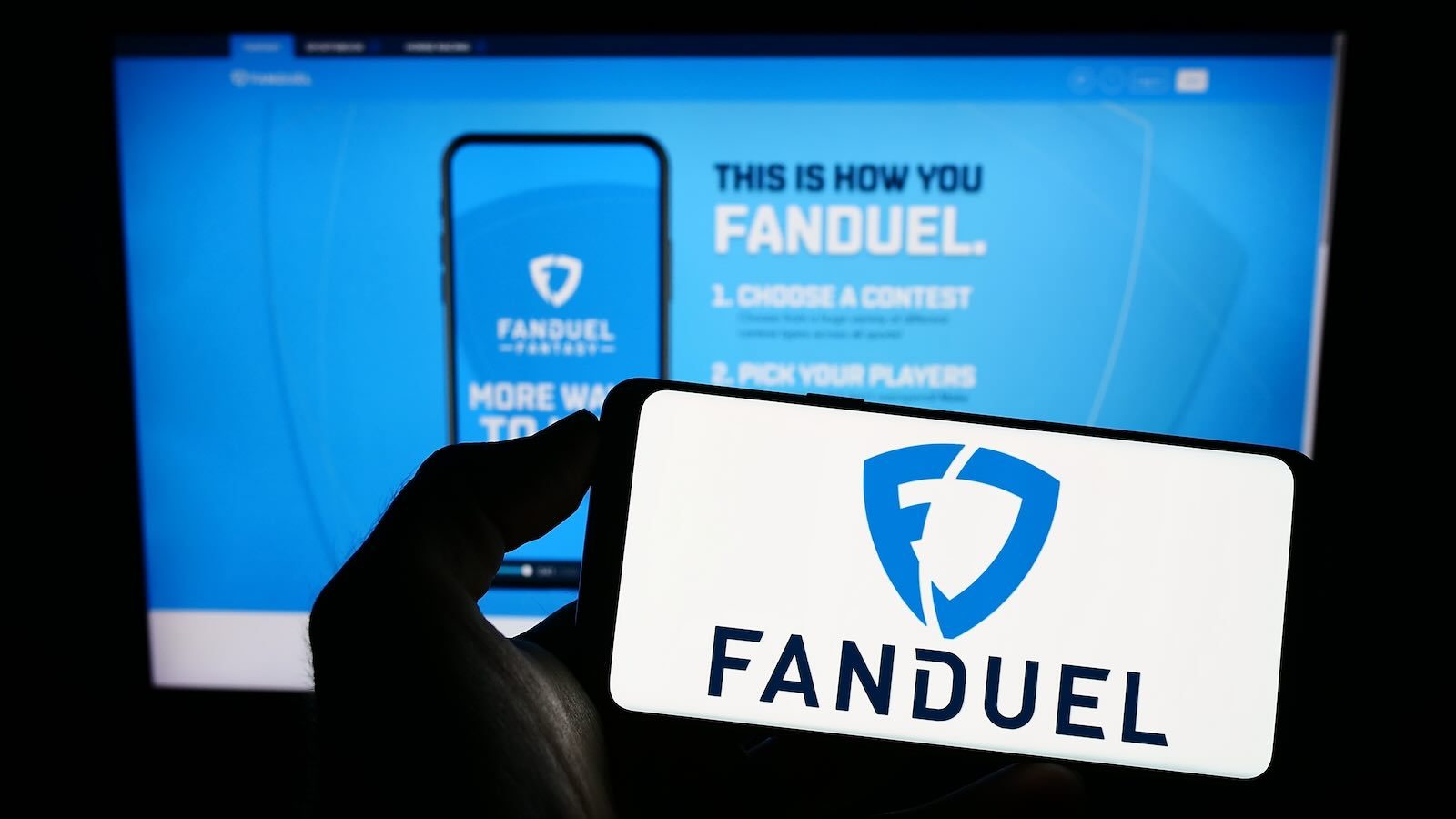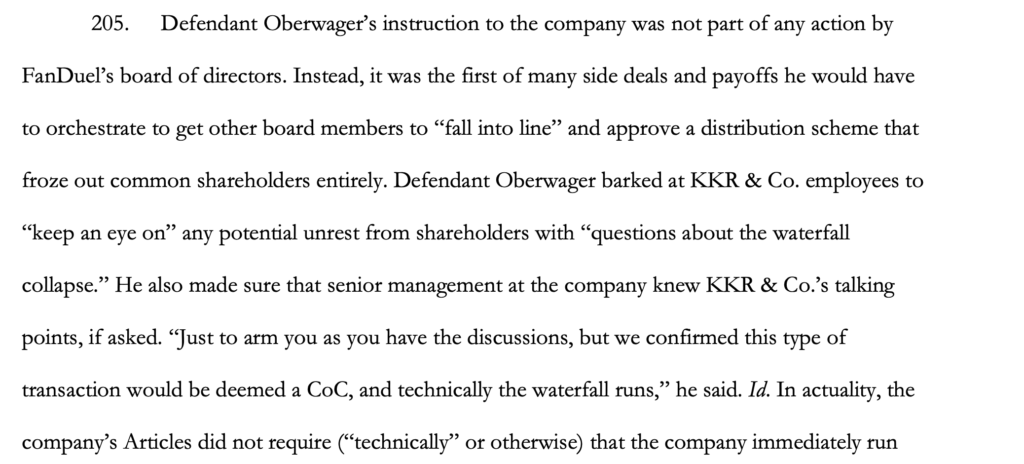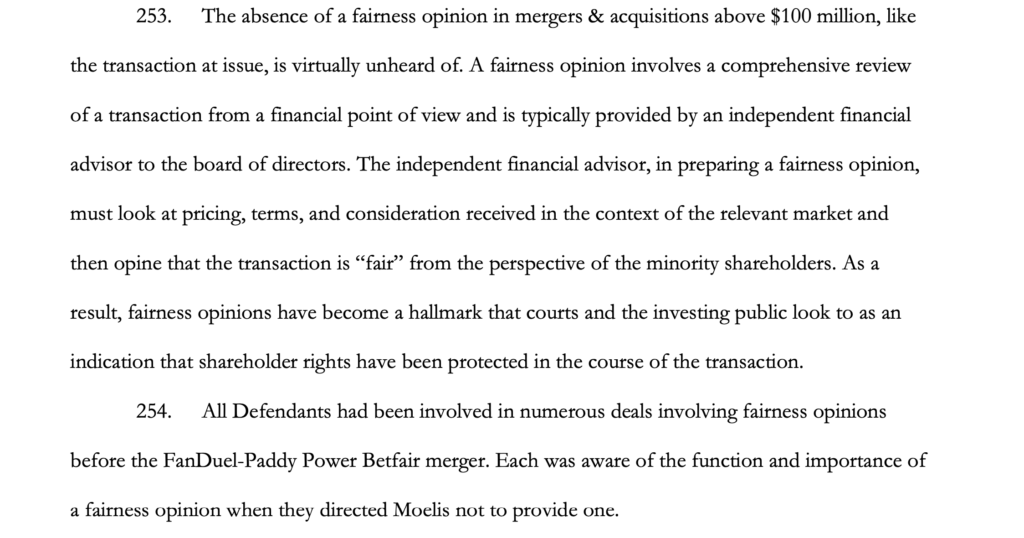Timing May Prove Telling In Expanded Legal Filing By Spurned FanDuel Shareholders
‘This was calculated and despicable conduct that subjected Plaintiffs to cruel and unjust hardship,’ the complaint reads
6 min

Last week’s 216-page amended complaint to the New York State Supreme Court by former FanDuel CEO Nigel Eccles and dozens of ex-colleagues against FanDuel investors KKR & Co. and Shamrock Capital Advisors is best explained in the context of what was going on in the greater world of U.S. gaming expansion simultaneously.
So for instance, the fact that then-daily fantasy sports giants FanDuel and DraftKings had begun discussions on a possible merger in late 2015 — with a pair of incremental steps forward made in 2016 — should be considered in the shadow of a pair of 2-1 sports betting lawsuit split verdicts that had been rendered by the U.S. Third Circuit Court of Appeals and an “en banc” review by all 12 circuit judges that also was not unanimous.
The unusual level of dissent — and the fact that the judge who wrote the majority verdict in the first case wound up being the dissenter in the second case, based on New Jersey lawmakers’ revisions to its sports betting law — meant that this could be a rare time when the U.S. Supreme Court might take on the case to resolve the conflicts.
Therefore, there was reason to believe that legal, regulated sports betting might soon gain traction all over the U.S. — not just limited to Nevada. That could have made a merger far more lucrative than a mere marriage of DFS companies, given the strong crossover potential in luring those customers across the room to old-fashioned sports betting.
Perhaps not coincidentally, then, in June 2017 the Federal Trade Commission challenged the proposed merger on the grounds that FanDuel and DraftKings combined controlled more than 90% of the daily fantasy sports market in the U.S. Just a month later, the merger plan was scrapped.
In the same month of the FTC declaration, the Supreme Court announced that it would indeed take on the five-year-old lawsuit by the NFL, NCAA, NBA, NHL, and MLB against the state of New Jersey, which sought to offer sports betting on the grounds that the Professional and Amateur Sports Protection Act of 1992 (PASPA) passed by Congress was unconstitutional.
Given that the Court, in an extremely rare move, had declined to accept the advice it had sought from the U.S. Solicitor General’s office that advised the Court a month earlier to take a pass on Murphy v NCAA, all of those familiar with the inner workings of the saga knew that it was extremely likely that PASPA at some point would be struck down by the nation’s top court.
This would be a bonanza, of course, for FanDuel and DraftKings given those lucrative customer databases of DFS players — databases that were even more valuable than those of traditional casino companies such as Caesars and MGM.
Also in mid-2017, Eccles — by then the only FanDuel founder who remained on the board of directors — clashed with fellow board members on the importance of ensuring that loyal employees would continue to be rewarded for their dedication.
“Hindsight demonstrates that the FanDuel board did not misunderstand the importance of equity compensation to employees,” the filing reads. “Instead, it was the beginning of a scheme hatched by the Defendants to cut the common shareholders out of the upside of the company they had built.”
Common shareholders wiped out
Eccles was dismissed by the board in November 2017, a move that Eccles says “shocked” him. He was replaced by Matt King, the former FanDuel chief financial officer and previously an executive with defendant KKR.
Behind the scenes, wheels were now in motion regarding a possible merger of FanDuel with Irish gaming industry giant Paddy Power Betfair (PPB), now known as Flutter Entertainment plc (Flutter), a bookmaking business created in 2015 with the combination of Paddy Power and Betfair. The bookmaker would possess the experience to fully maximize the opportunity that was expected to come.
In April 2018, FanDuel executives estimated that “The sports gambling opportunity was 10-15 times larger than FanDuel’s existing daily fantasy sports business.” That same month, FanDuel and Paddy Power Betfair executives held a pair of meetings in New York City to discuss the possible merger.
A term sheet was then settled on April 28, 2018 — and that is when Eccles and his fellow plaintiffs say the financial shenanigans by the defendants further began to take shape. No valuation, they allege, was placed on the likelihood of country-wide sports betting expansion that was the basis for the merger.
This all took place with all involved knowing that a ruling from the highest Court would come no later than the end of June of that year, and that defendant New Jersey was now a prohibitive favorite to prevail over the NFL and four other major sports organizations.
The underlying, core allegation is that the self-interested board members steered a depressed price for FanDuel of $559.4 million in the merger with PPB, such that defendants KKR, Shamrock, King, and others, would have a greater share in the combined company known as PandaCo, and sharper financial upside in general. A series of alleged side deals and bribes helped align all of the defendants’ interests to effectuate the vote and a hasty closing of the deal in a way that froze out the entire class of common shareholders.

PPB’s stock price jumped by more than 12% on the day of the Supreme Court ruling to open the floodgates on May 14, 2018 — a hint of how much new revenue any gaming operator that would be involved in the sports betting gold rush might have a chance to capture.
Bradley Tusk of Tusk Ventures, a FanDuel investor, told ESPN at the time that the court ruling “doubled the value” of his company’s stake and that that value could reach five times the pre-ruling value, if and when dozens of states legalized the gambling (as they subsequently did).
Yet even in that environment, the filing notes that defendants refused to provide what is known as a “fairness opinion.”

As the filing explains, “A fairness opinion by an investment bank is standard ubiquitous in freezeout mergers like the FanDuel-Paddy Power Betfair deal where the result of the transaction is the elimination of a class of shareholders in the company. It functions as an outside assurance as to the fairness of the transaction to all existing shareholders.”
Perhaps most relevant in this case is that according to the filing, the defendants voted to approve the merger eight days after the Supreme Court ruling — without even taking into account the enormous increase in value to both companies from a new U.S. gambling landscape. The allegation is that these financial decisions enormously benefited six of the seven board members, thereby creating a clear conflict of interest, ultimately giving rise to this cause of action.

It is possible that the Court’s ruling in mid-May, rather than as part of an annual flurry of late-June ruling announcements, complicated this saga. The defendants likely will have to address in their response the question of why the Court decision apparently was ignored as the deal was being finalized.

While FanDuel preferred shareholders received 40% of the equity in the new company, Eccles and the other plaintiffs claim that the company’s board used a “phony valuation” of just $559.4 million to effectively “wipe out” common shareholders that included FanDuel’s founders. Not even two years later, the investors sold that 40% stake for $4.2 billion. The plaintiffs estimate they were entitled to a collective $120 million before punitive damages also are considered.
Plaintiffs detail ‘despicable conduct’

“The number Defendants put on FanDuel’s 40% interest was not based on any arms-length negotiation, independent appraisal, or even any actual valuation of the merged company itself,” the filing reads. “Had FanDuel’s board of directors fairly acknowledged the enormous value of the shares in the newly merged company that FanDuel received, FanDuel’s common shareholders (like Plaintiffs) would have gotten shares in the newly merged company and shared in the upside of the U.S. sports gambling market alongside the Defendants.

“As a result of Defendants’ wrongful conduct, common shareholders in FanDuel — including the people who founded it, key employees who built it, and early-stage investors who supported it — received nothing for their investments in the Company. Meanwhile, Defendants took more than $4 billion, with some individual directors personally pocketing more than $100 million.”

“Standing up against the likes of KKR is not easy, but I’m determined that the team of 100+ amazing people who spent years building FanDuel from the ground up will get back what was stolen from them in 2018,” Eccles wrote in a post on X.
“Plaintiffs are the founders, employees, and early investors who built FanDuel Ltd. from an obscure Scottish company into one of the preeminent brands in sports gaming in the United States,” the filing noted.
Ultimately, the filing concludes with the plaintiffs seeking compensatory damages as well as punitive damages based on the defendants’ deliberate and intentional disregard of the plaintiffs’ rights and interests.
Next steps will include a response to the amended complaint from the defendants. Meanwhile, as the plaintiffs surely know, FanDuel continues to register record revenue and profits, quarter after quarter, dwarfing conservative projections made during the crucial period under examination now for its own potential market future share in the U.S.
Stay tuned.





